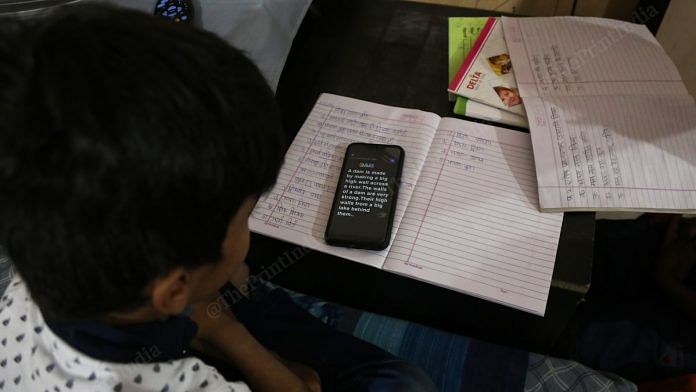New Delhi: Union Finance Minister Nirmala Sitharaman’s proposals for digital education have stirred a debate among experts on whether the push for online tools will help recoup the pandemic-induced learning loss among children.
While some have criticised the “lack” of a simultaneous push to offline learning, others like Edtech entrepreneurs have welcomed the move as a step towards “democratisation” of education.
The finance minister had, in her Budget speech Tuesday, announced the launch of a ‘digital university’ and expansion of the scope of the ‘One Class, One TV Channel’ initiative from 12 to 200 channels covering all regional languages. While digital education got a fillip of Rs 83 crore, the Samagra Shiksha Abhiyan, which focuses on increasing accessibility to online education for poor students, saw a significant rise to Rs 37,383 crore from Rs 30,000 crore last year.
“Due to pandemic-induced school closure, our children have lost almost two years of formal education. We recognise the need for supplementary teaching and building resilient mechanisms for education delivery,” Sitharaman said.
Government sources told ThePrint that television channels “have the potential of reaching the remotest areas of the country”, which can resolves the issue of internet connectivity.
The Budget has, in fact, also made a push to make offline education more robust. The outlay for school education has been hiked by 9 per cent (to Rs 63,449.37 crore from Rs 54,873.66 crore in 2021-22). The allocation for higher education has also been increased to Rs 40,828.35 crore in 2022-23 from Rs 36,031.57 crore last year. In August 2021, the Samagra Shiksha Abhiyan was revamped with an increased budgetary allocation to address early childhood education, teacher education, and foundational literacy for offline education.
However, experts including a former Union education secretary say this is not enough.
Also read: No populism, no tax cuts, only capex & focus on infrastructure, growth in Modi govt’s Budget
‘Offline push also necessary’
Education experts have differing views on the government’s digital education push.
Prof. R. Govinda, former vice-chancellor of the National University of Educational Planning said building up online education without strengthening the infrastructure for offline education isn’t a solution.
“It is a good idea to improve digital education in the country, but lack of infrastructure will only widen the digital divide. We cannot build a good digital setup in the absence of good offline education,” Govinda told ThePrint.
“You cannot develop digital means without having a solid foundation on the ground. This is why teaching in schools should be improved first, without it online education will be mechanical lacking economic, social context.”
Former education secretary Anil Swarup said the Budget still does not address the problems that children who are already out of the schooling system are facing.
“The major problem today is that children have dropped out of school, especially girls. Their problems cannot be addressed by digital means. This needs social intervention from organisations on the ground and the current government has already shown its hesitation in taking help from NGOs,” he said.
Swarup added that children in poor urban and rural areas still do not have either the devices or connectivity to be able to learn online. “The focus of this Budget should have been equally on improving teacher training and school infrastructure instead of emphasising just on digitising education,” he said.
Edtech sector welcomes Budget
The post-pandemic disruption in education has led to a boom for Edtech startups in India, which have raised about $4 billion since 2020 — of which $2.2 billion were raised in 2020 and $1.9 billion between January and 3 August 2021.
Welcoming the government’s digital push, Vamsi Krishna, founder of Vedantu, said by providing students easy access to quality learning, this year’s Budget laid a clear emphasis on reducing the gap between students in remote areas.
“Initiatives such as the ‘One Class One TV Channel’ and the E-Vidya scheme are welcome moves that will drive impact at scale and bridge the language divide amongst students from small-town India. We believe that this Budget rightly aligns with our vision of democratising education by providing students access to high-quality learning, improving learning outcomes, and thereby contributing to a vibrant knowledge economy,” said Krishna.
(Edited by Manoj Ramachandran)
Also read: How Modi govt has given legal sanction to cryptocurrencies in India, through the backdoor



